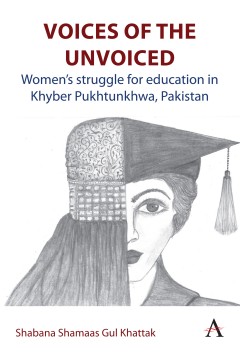Voices of the Unvoiced
Women’s struggle for education in Khyber Pukhtunkhwa, Pakistan
By Shabana Shamaas Gul Khattak
Other Formats Available:
- About This Book
- Reviews
- Author Information
- Series
- Table of Contents
- Links
- Podcasts
About This Book
This book focuses on Pukhtun women’s educational struggle in the traditionalist Pukhtun society to succeed against the odds in Pukhtunkhwa, Pakistan. The study found higher education as a means of women's liberation – their struggle and experiences for higher education give them a unique position in their patriarchal culture. The province is dominated by the culture rather than the teaching of Islam. Therefore, people make decisions according to the Pukhtun culture and social values. Strong roots of patriarchy reinforced a religious misinterpretation that ‘culturalised’ Islam instead of Islamising their culture in the prevailing society. Both the stories of the book concluded patriarchy was the main cause of women's marginalisation, which further granted a fertile ground for the Taliban to sketch a strategic atrocity and ban women's education in the name of Islam in the Swat Valley.
Patriarchy and militarisation have been used as a tool for cultural governance of identity and maintenance of gender stratification by sharing common grounds of gender dynamics and women epistemology under liberal, radical Marxist/socialist, Islamic feminism and feminist peace and conflict theories of women security. Thus, the book discussed feminist approaches concerned about unequal opportunities in higher education that challenged the propagation of male-experience and knowledge.
The scope of the book is broad and focused on women empowerment and emancipation through education. It addresses issues related to young Pukhtun women from disadvantaged areas who aspire to get higher education. The main focus of the book is to hear Pukhtun women’s own voices while discussing the issues related to higher education.
Reviews
‘The world is filled with overlooked stories, sometimes discarded and distorted, sometimes purposefully silenced, but many of these have one unifying element: they concern women’s life experiences and their ideas and perspectives. Shabana Khattak’s Voices of the Unvoiced is a compelling, rich book in which she has distilled years of research and scholarly work and her own attentive, authentic listening. As a result, she challenges the flawed narratives that often surround Muslim women’s lives and advances Islamic Feminism. It is an important book’. — Dr Leena Helavaara Robertson, Associate Professor in Education, Middlesex University
‘This book achieves a high level of questioning and research related to the lack of opportunities for women to receive higher education on par with men in a specific region of Pakistan. It alerts the reader to the plight of women there, raising important areas as to the causes of this discrimination. I highly recommend you read it’. — Gillian Hilton, Vice President, British Federation of Women Graduates
‘An astonishing book by a brave Islamic woman author, voicing Islamic women’s own words about society, Islam, dress codes and life. Very importantly, it includes the voices of both educated and non-educated women, rural working class as well as middle- and upper-class women. Shabana Khattak advances Islamic Feminism, critiquing ‘culturalised’ Islam, as well as liberal and Marxist feminisms – from an Islamic Feminist perspective. A very powerful book!’ — Dave Hill, Emeritus Professor of Education at Anglia Ruskin University, Chief Editor, Journal for Critical Education Policy Studies
‘This book is an indigenous work as it courageously unveils the silenced narratives of Pukhtun Women’s struggle for acquiring education to make themselves visible in a male-dominated society thwarted by tribal norms. It is a must-read for those committed to empowering women through education and breaking societal barriers’. — Dr. Razia Sultana, Professor of History, Quaid-I-Azam University, Islamabad. Former Vice Chancellor, Shaheed Benazir Bhutto Women University, Peshawar, Pakistan
Author Information
Dr. Shabana Shamaas Gul Khattak is a woman activist, who wants to serve humanity, especially for women empowerment and emancipation.
Series
Table of Contents
Foreword; Prologue; Acknowledgements; The Standpoint of the Author as a Researcher; PART I: WOMEN IN PUKHTUN SOCIETY; PART II: THEORETICAL PERSPECTIVES; PART III: UNTOLD STORIES OF WOMEN AND EDUCATION; PART IV: TOWARDS EMANCIPATION AND EMPOWERMENT; Epilogue; Bibliography; Appendix 1: Maps of Pukhtunkhwa and Swat ; Appendix 2: Introduction to the Focused Group Interviwees; Appendix 3: Introduction to the Sample Women of Swat ; Index
Links
Stay Updated
Information
Latest Tweets



